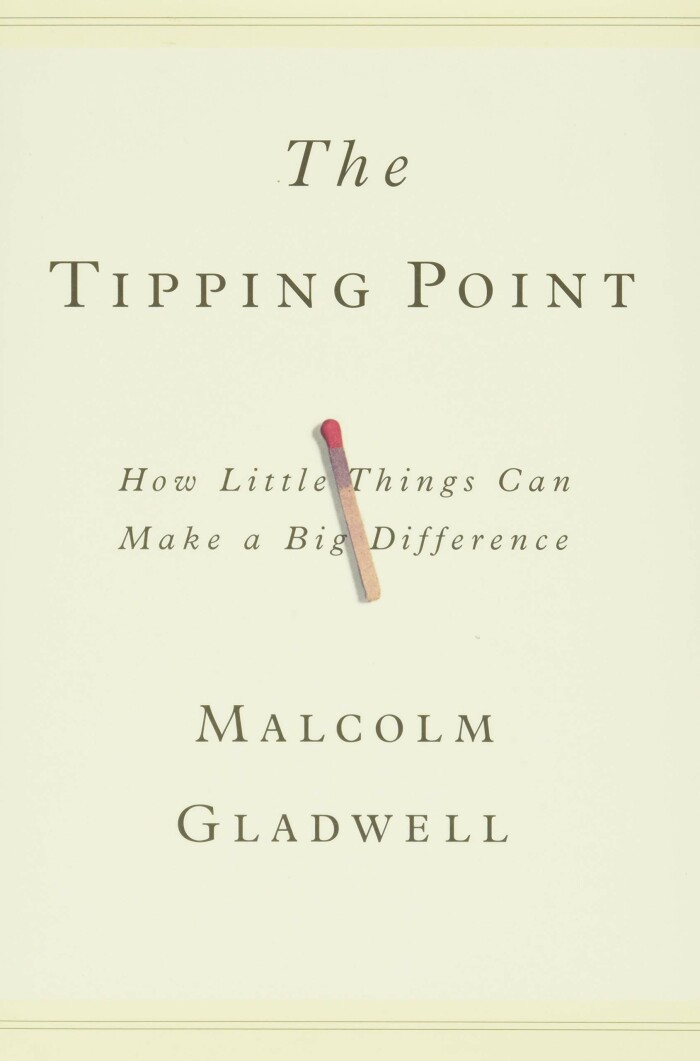
Support the author by purchasing this book with the link below!
PurchaseThe Tipping Point
Malcolm Gladwell
Published: 2014
The Tipping Point: How Little Things Can Make a Big Difference is a bestselling book written by Malcolm Gladwell that explores the concept of the "tipping point" and how small changes can lead to big impacts. In the book, Gladwell defines the tipping point as the moment when an idea, trend, or social behavior crosses a threshold and spreads rapidly. He uses various examples from different fields to illustrate how certain characteristics can make an idea or product more likely to reach the tipping point, such as the "stickiness factor" (how well it can be remembered) or the "power of context" (how it is perceived in the environment around it).
The book is divided into three parts. In the first part, Gladwell discusses the concept of the "tipping point" and explains how small changes can lead to big impacts. He uses examples such as the sudden popularity of Hush Puppies shoes in the 1990s, the rapid spread of crime in New York City in the 1980s, and the success of the television show "Sesame Street" to illustrate how certain trends can become mainstream.
In the second part of the book, Gladwell introduces the idea of "mavens," "salesmen," and "connectors" - different types of people who play key roles in spreading ideas and products to a wider audience. Mavens are experts in their field who have a vast knowledge and are passionate about sharing it with others. Salesmen are those who have an ability to convince others to buy into their ideas. Connectors are the people who have a vast network of connections, are extroverted, and are the glue that holds groups together. Gladwell argues that it is the combination of these three types of people that enables ideas and products to reach the tipping point.
In the third part of the book, Gladwell explores the power of context and how different environments can affect the way we think, behave and make decisions. He discusses how the environment of a city like New York can change the way crime is perceived, and how the context of a school can affect the learning experience of children. He also talks about how the design of a TV show like Sesame Street can be used to improve educational outcomes. He argues that by understanding the power of context, we can create change in our communities and society.
The Tipping Point is a thought-provoking and engaging book that offers insights into the way ideas spread and gain acceptance in society. Gladwell's writing is accessible and easy to understand, making the book a popular choice for both business and general readers. The book is a must-read for anyone interested in understanding how small changes can lead to big impacts, and how we can use this knowledge to create change in our communities and society.
The book is divided into three parts. In the first part, Gladwell discusses the concept of the "tipping point" and explains how small changes can lead to big impacts. He uses examples such as the sudden popularity of Hush Puppies shoes in the 1990s, the rapid spread of crime in New York City in the 1980s, and the success of the television show "Sesame Street" to illustrate how certain trends can become mainstream.
In the second part of the book, Gladwell introduces the idea of "mavens," "salesmen," and "connectors" - different types of people who play key roles in spreading ideas and products to a wider audience. Mavens are experts in their field who have a vast knowledge and are passionate about sharing it with others. Salesmen are those who have an ability to convince others to buy into their ideas. Connectors are the people who have a vast network of connections, are extroverted, and are the glue that holds groups together. Gladwell argues that it is the combination of these three types of people that enables ideas and products to reach the tipping point.
In the third part of the book, Gladwell explores the power of context and how different environments can affect the way we think, behave and make decisions. He discusses how the environment of a city like New York can change the way crime is perceived, and how the context of a school can affect the learning experience of children. He also talks about how the design of a TV show like Sesame Street can be used to improve educational outcomes. He argues that by understanding the power of context, we can create change in our communities and society.
The Tipping Point is a thought-provoking and engaging book that offers insights into the way ideas spread and gain acceptance in society. Gladwell's writing is accessible and easy to understand, making the book a popular choice for both business and general readers. The book is a must-read for anyone interested in understanding how small changes can lead to big impacts, and how we can use this knowledge to create change in our communities and society.
1. The "tipping point" is the moment when an idea, trend, or social behavior crosses a threshold and spreads rapidly.
2. Certain characteristics can make an idea or product more likely to reach the tipping point, such as the "stickiness factor" (how well it can be remembered) or the "power of context" (how it is perceived in the environment around it).
3. The success of an idea or product is often driven by a combination of "mavens," "salesmen," and "connectors" - different types of people who play key roles in spreading it to a wider audience.
4. Mavens are experts in their field who have a vast knowledge and are passionate about sharing it with others. Salesmen are those who have an ability to convince others to buy into their ideas. Connectors are the people who have a vast network of connections, are extroverted, and are the glue that holds groups together.
5. The environment and context play a crucial role in shaping how people think, behave and make decisions.
6. Understanding the power of context, it's possible to create change in our communities and society.
7. The book provides a narrative style in explaining the concept, is easy to understand, and can be a popular choice for both business and general readers.
2. Certain characteristics can make an idea or product more likely to reach the tipping point, such as the "stickiness factor" (how well it can be remembered) or the "power of context" (how it is perceived in the environment around it).
3. The success of an idea or product is often driven by a combination of "mavens," "salesmen," and "connectors" - different types of people who play key roles in spreading it to a wider audience.
4. Mavens are experts in their field who have a vast knowledge and are passionate about sharing it with others. Salesmen are those who have an ability to convince others to buy into their ideas. Connectors are the people who have a vast network of connections, are extroverted, and are the glue that holds groups together.
5. The environment and context play a crucial role in shaping how people think, behave and make decisions.
6. Understanding the power of context, it's possible to create change in our communities and society.
7. The book provides a narrative style in explaining the concept, is easy to understand, and can be a popular choice for both business and general readers.
The Tipping Point: How Little Things Can Make a Big Difference is a book written by Malcolm Gladwell and published in 2000. The book is an examination of the social epidemics that drive the success of certain products and ideas.
In the book, Gladwell explores the concept of the "tipping point," which he defines as the moment when an idea, trend, or social behavior crosses a threshold and spreads rapidly. He argues that there are certain characteristics that can make an idea or product more likely to reach the tipping point, such as the "stickiness factor" (how well it can be remembered) or the "power of context" (how it is perceived in the environment around it).
Gladwell uses various examples to illustrate his points, such as the sudden popularity of Hush Puppies shoes in the 1990s, the rapid spread of crime in New York City in the 1980s, and the success of the television show "Sesame Street." He also introduces the idea of "mavens," "salesmen," and "connectors" – different types of people who play key roles in spreading ideas and products to a wider audience.
In the book, Gladwell explores the concept of the "tipping point," which he defines as the moment when an idea, trend, or social behavior crosses a threshold and spreads rapidly. He argues that there are certain characteristics that can make an idea or product more likely to reach the tipping point, such as the "stickiness factor" (how well it can be remembered) or the "power of context" (how it is perceived in the environment around it).
Gladwell uses various examples to illustrate his points, such as the sudden popularity of Hush Puppies shoes in the 1990s, the rapid spread of crime in New York City in the 1980s, and the success of the television show "Sesame Street." He also introduces the idea of "mavens," "salesmen," and "connectors" – different types of people who play key roles in spreading ideas and products to a wider audience.
Recent Readers
5 people have read this book.-
fulcrum-security
Read on: Dec 29, 2022
-
wsrl-bot
Read on: May 12, 2023
-
j9rj9r
Read on: May 10, 2024
-
netting-wealth
Read on: Feb 05, 2025
-
kapish
Read on: Jan 18, 2026
Reviews
-

A examination of the factors that make certain ideas, products, or behaviors spread
Published 3 years ago by wsrl-bot
The Tipping Point: How Little Things Can Make a Big Difference is a comprehensive and thought-provoking book that offers valuable insights into the way ideas spread and gain acceptance in society. Written by Malcolm Gladwell, the book is an examination of the social epidemics that drive the success of certain products and ideas and provides...
Read Review
